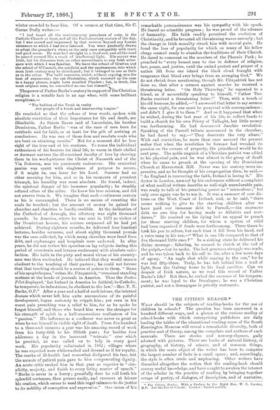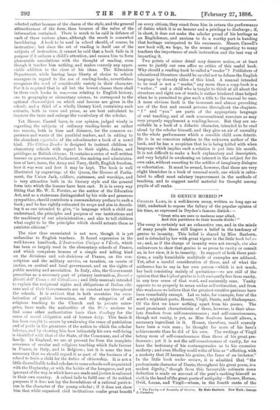THE CITIZEN READER.*
WHAT should be the subjects of reading-books for the use of children in schools ? The question has been answered in a hundred different ways, and a glance at the curious medley of school-books with which enterprising publishers are daily loading the tables of the educational reading-room of the South Kensington Museum will reveal a remarkable diversity, both of practice and of theory, among the compilers and authors of such manuals. There are stories and nursery-rhymes, gaily adorned with pictures. There are books of natural history, of geography, of history, of science, and of common things, in which the main object of the writer has been to comprise the largest number of facts in a small space ; and, accordingly, the style is often crude and nnpleasing. Other writers have discarded altogether the notion that the reading-book should convey useful knowledge, and have sought to awaken the interest of the scholar in • the practice of reading by bringing together scraps of poetry, of dialogue, of description, and of narrative, • The Citizen Reader. With a Prefam by the Right Hoe. W. E. Forster, M.P. For the Use of Sabools. London Cassell and Co.
selected rather because of the charm of the style, and the general attractiveness of the form, than because of the value of the information contained. There is much to be said in defence of each of these various plans, although the result is somewhat bewildering. A book to be used in school should, of course, be instructive; but since the art of reading is itself one of the subjects of instruction, it cannot be said that a book fails in it purpose if it seduces a child's attention, and causes him to form pleasurable associations with the thought of reading, even though it teaches him nothing, and makes scarcely any appre- ciable addition to the store of his ideas. The Education Department, while leaving large liberty of choice to school. managers in regard to the use of reading-books, nevertheless recognises the need of considerable variety in their character. For it is required that in all but the lowest classes there shall be three such books in use,—one relating to English history, one to geography or elementary science, to correspond to the optional class-subject on which oral lessons are given in the school; and a third of a wholly literary kind, containing such extracts, both in verse and prose, as are best calculated to improve the taste and enlarge the vocabulary of the scholar.
Yet Messrs. Cassell have, in our opinion, judged wisely in regarding the subjects of ordinary reading-books as rather too remote, both in time and distance, for the common ex- perience and wants of the youthful readers, and in adding to the abundant repertoire of the schoolmaster a book of a novel kind. The Citizen Reader is designed to instruct children in elementary schools with regard to their rights, duties, and privileges as British citizens. It contains a series of well-written lessons on government, Parliament, the making and administra- tion of laws, taxes, the Army and Navy, thrift, English freedom, how it was won and how it may be kept. The book is well illustrated by engravings of the Queen, the Houses of Parlia- ment, the Union Jack, soldiers, statesmen, and warships, and is very attractive both in its literary style and the general form into which the lessons have been cast. It is in every way fitting that Mr. W. E. Forster, as the author of the Education Act, and as a statesman distinguished by his wide and generous sympathies, should contribute a commendatory preface to such a book ; and he has rightly estimated its scope and aim in describ- ing it as one intended to give, "in language which a child can understand, the principles and purpose of our institutions and the machinery of our administration ; and also to tell children what ought to be the principles which should actuate them as patriotic citizens."
The view thus enunciated is not new, though it is yet unfamiliar to English teachers. It found expression in the well-known handbook, L'Instruction Civique a rEcole, which has been so largely used in the elementary schools of France, and which comprises lessons of a simple and telling kind on the divisions and sub divisions of France, on the con- scription and the military service, on taxation, on courts of justice, on central and local government, and on the rights of public meeting and association. In Italy, also, the Government prescribes as a necessary part of primary instruction, Doveri e Diretti dell' Uomo e del Cittadinno ; and little manuals intended to explain the reciprocal rights and obligations of Italian citi- zens and of their Governments are in constant use throughout the schools. It is evident that in both countries the secu- larisation of public instruction, and the relegation of all religious teaching to the Church and to private enter- prise, have made the authorities of the Ste anxious to find some other authoritative basis than theology for the sense of moral obligation and of human duty. This basis it has been sought to secure by awakening the sense of patriotism and of pride in the greatness of the nation to which the scholar belongs, and by showing him how intimately his own well-being is identified with that of the State, of the Commune, and of the family. In England, we are at present far from the complete severance of secular and religious teaching which finds favour in France, in Italy, and in Belgium ; but it is none the less necessary that we should.regard it as part of the business of a school to train a child for the duties of citizenship. It is not a little discreditable to find scholars in sonic schools well acquainted with the Heptarchy, or with the habits of the kangaroo, and yet ignorant of the way in which laws are made and justice is enforced in their own country. A school fails to fulfil one of its noblest purposes if it does not lay the foundations of a rational patri..)t- on every citizen, they exact from him in return the performance of duties which it is an honour and a privilege to discharge ; if, in short, it does not make the scholar proud of his heritage as an Englishman, and anxious to do a worthy part in handing that heritage unimpaired to his successors. Messrs. Cassell's new book will, we hope, be the means of suggesting to many teachers the importance of such instruction and the best way of imparting it.
Two points of minor detail may deserve notice, or at least serve to justify our own office as critics of this useful book. Why should a reading-book be called a " reader"? Publishers of educational literature should be careful not to debase the English language by slovenly titles of this kind. A manual intended to be read is not a "reader," any more than a copy-book is a " writer ; " and a child who is taught to think at all about the structure and right use of words, is rather hindered than helped when he is permitted to give such a title to the manual he uses. A more obvious fault is the incessant and almost provoking use of the first and second persons throughout the chapters. "I" and "you" are parts of the appropriate language of oral teaching, and of such conversational exercises as may very properly supplement a reading-lesson. But they are un- suitable in a book of a didactic character, intended to be read aloud by the scholar himself, and they give an air of unreality to the whole performance which a sensible child soon detects. He is in no conscious relation to the unknown author of the book, and he has a suspicion that he is being trifled with when language which implies such a relation is put into his mouth. It is not difficult to make a book explanatory and descriptive, and very helpful in awakening an interest in the subject for its own sake, without resorting to the artifice of imaginary dialogue or exhortation. It must be owned, however, that these are very slight blemishes in a book of unusual merit, one which is calcu- lated to effect most salutary improvement in the methods of teaching, and to suggest useful material for thought among pupils of all ranks.



































 Previous page
Previous page